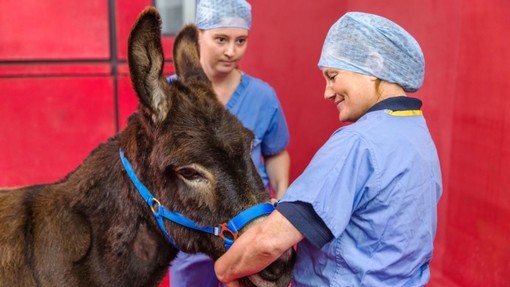Donkeys require specialist feeding
Donkeys have very different nutritional requirements to horses and ponies and these should be considered in the hospital situation and during recovery:
- Donkeys require fewer calories to maintain weight than a pony of the same size and are particularly prone to obesity and laminitis when kept as companion animals. They need careful dietary management to avoid problems.
- The voluntary dry matter intake (DMI) of donkeys fed on low energy, fibrous forages is 1.3 – 1.7% BW daily dependent on the time of year.
- For maintenance, donkeys require between 80 - 95kJ DE/Kg BW/day.
- Donkeys should be trickle fed with appropriate provision of suitable fibre for a minimum of 14 – 18hrs a day.
- Donkeys should be able to maintain weight well on diets based around high fibre, low energy forages without the need for supplementary feeding.
- If supplementary feeds are required, high fibre, low sugar/starch products should be used in preference to cereal grain based feeds which have been found to increase the risk of conditions such as gastric ulceration, colic and laminitis. If the donkey is not hyperlipaemic or anorexic and has good liver function then extra calories may also be provided using a fat/oil based feed or supplement.
Donkeys may be fed a predominantly straw-based diet at home and a sudden switch to hay or haylage may precipitate colic or laminitis. Check the donkey’s normal diet with the owner.
Specific dietary changes for hospitalised donkeys
Inappetance may be seen in the sick or stressed donkey and the nutritional management of the hospitalised donkey should focus around the need to stimulate the appetite:
- Tasty tempters such as; peppermint cordial, fresh mint leaves, 2-3 ground ginger biscuits and/or chopped or grated fruit/vegetables can be added to feeds
- If the donkey is not on supplementary feeds or won’t eat from a bucket, tempters such as freshly picked grass or a safe browse, chopped apples, chopped or grated carrots, bananas (particularly the skin), ginger biscuits and/or mints can be offered by hand. See Factsheet: Safe treats for additional ideas to try.
- Donkeys are natural browsers and taking them to a hedgerow may also prove successful in stimulating appetite. See Factsheet: Safe trees and shrubs.
If the donkey does not have a reasonable level of voluntary food intake, it may be necessary to consider nasogastric intubation and/or parenteral nutrition. See The Clinical Companion of the Donkey.
Dental disease inpatients
Donkeys that are hospitalised for dental treatment may have a diet that is adapted for their dental condition.
- Many donkeys with dental disease will still be able to grasp and chew grass but may be unable to chew long fibre forages such as straw, hay or haylage.
- Long fibre forages may have been replaced with short chopped chaff products, which tend to be easier to chew. See Factsheet: Feeding donkeys with dental problems for further information.
However, where the patient is not on a diet that has been adapted for their dental condition, a sudden change in diet at the same time as other stressful events, such as travel, hospitalisation and any separation from companions would not generally be recommended.
Possible complications during hospitalisation
Hyperlipaemia, colic and colitis
Many donkeys find hospitalisation stressful as they are often used to pasture access and relative isolation from horses.
- Monitor triglycerides regularly to detect hyperlipaemia. See Factsheet: Hyperlipaemia in donkeys for more information.
- Check carefully for stress induced colitis by monitoring levels of total protein, albumin and white cells count.
- Donkeys with colitis may not exhibit diarrhoea.
- Assess gut motility regularly by auscultation, check faecal output, rectal exam if needed.
- Donkeys will have few overt signs of impending colic due to their stoic nature and the use of NSAIDs will make diagnosis even more difficult.
- Ensure the appetite and faecal output of the hospitalised animal’s companion(s) are also monitored carefully as a hospital stay can be stressful for them too.
Weight gain
Donkeys that are hospitalised, and especially those that are confined to box rest during recovery are likely to have a reduced ability to exercise:
- Exercise restricted donkeys can rapidly gain weight without proper management.
- Overweight donkeys will be at an increased risk of developing laminitis.
- Regular weighing alongside condition scoring, is recommended:
- Use donkey specific body condition scoring tools (scoring methods used for donkeys are different from those used for horses/ponies). See Donkey Body Condition Scoring factsheet below.
- If weigh scales are not available, the donkey’s weight can be estimated using a donkey specific weigh tape (tapes designed for horses/ponies tend not to be accurate) or our donkey specific weight estimator can be used however this is not accurate for changes of less than 5kg. See Donkey Weight Estimator factsheet below.
- Regular heart girth measurements can also be used to give an indication of changes in weight.
Boredom
Donkeys that are hospitalised may become bored due to a lack of mental and/or physical stimulation and this may lead to stress:
- Provision of enrichment can help reduce boredom and stress and can be especially useful for dietary restricted and box rested donkeys.
- Provide non- toxic logs and/or browse - such as brambles and branches. See Factsheet: Safe Trees and Shrubs for ideas on which species are safe for donkeys.
- Provide safe toys such as old welly boots, rubber feed buckets, tyres, horse play balls or rope dog toys.
- Be creative and invent new ways of presenting enrichment ideas such as hiding small pieces of carrot at the bottom of welly boots or in straw filled cardboard boxes.
- Renew and refresh enrichment items regularly to maintain their appeal and novelty. See the Environmental Enrichment resource for further information and ideas.




